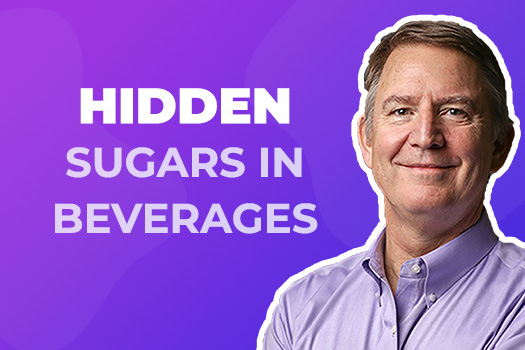A public health measure that could be taken to reduce obesity, diabetes and, for that matter, dental issues like cavities and periodontal disease, would be to get rid of sugar in drinks. Let me explain why: it’s everywhere! Unless it’s a diet drink or just water, sugar is in many drinks.
Sweet drinks are absorbed quickly into the bloodstream
Most health experts say that sugar-sweetened beverages (SSBs) should at least be limited. I think they shouldn’t be consumed at all, simply because of the effect they have on your blood sugar. Think about it: if you have a liquid form of sugar in water or soda, it doesn’t even have to be digested much in order for it to be absorbed right through the stomach or intestine into the bloodstream. Probably the worst offender for raising blood sugar really fast is a sugar-sweetened beverage. We try to protect against blood sugar (blood glucose) elevation and the insulin rise that happens after that. That is the cascade of events that leads to obesity, pre-diabetes, and type 2 diabetes.
Sugar in tea and fruit juice beverages
In my area, in the southern United States, sugar in beverages is so common. Tea is always “sweet tea” unless otherwise requested. If you go to a restaurant and ask for tea, you’re basically going to get tea with sugar in it. A friend of mine who came down from the North to practice medicine in the South didn’t realize that the tea was sweet unless otherwise specified. He had to learn that the hard way by consuming it himself and then also dealing with his patients regarding sweet tea.
Juice is another thing that is not recognized as a sugar-sweetened beverage because people will tell me that it’s natural sugar. Even natural sugar raises blood sugar (blood glucose). Refined juices at the store have lots of sugar in them. When you consume those, your glucose goes up, which causes insulin to go up to lower the blood glucose. It’s that multiplication of glucose times insulin that is the damaging marker. We want to keep the glucose and insulin low by whatever means.
Artificial sweeteners are acceptable
If you think of beverages, water is probably the best beverage to have, although many of us were raised with the idea of drinking something sweet. That’s why I don’t mind people using something other than sugar to sweeten their beverages. Diet soda, for example, has no carbs. I teach people to look at the label and look at the number that comes after total carbohydrates. If it’s a zero for the beverages then that’s just fine, it doesn’t matter to me. If you want to have coffee and sweeten it with any of these non-sugar sweeteners, that’s fine, because it doesn’t have much impact on the metabolism.
I am still holding out for a scientific paper that shows evidence that these artificial sweeteners or non-sugar sweeteners raise the insulin level. I will handsomely reward you with credit because I think there is a lot of inappropriate fear about these non-sugar sweeteners. I have not seen a paper in the context of a low-carb diet showing that these non-sugar sweeteners have any effect on the insulin level. There is one paper with people who are eating carbs, so that doesn’t count. It has to be in patients who are not eating carbs to make it relevant to the low-carb or keto context.
Sugar in commercial beverages
I just went to “Dr. Google” and pulled up an image of how much sugar is in your drink. Of course, water contains zero sugar. Diet sodas will have zero and many of these power drinks or sports drinks now come in a zero sugar version. Regular sports drinks, however, have up to 21 grams of carbs per 12-ounce serving. You always have to look at the serving size because often, you are having more than the serving size which means you’ll have more than just the amount stated on the label.
Sweetened iced tea contains 40 grams, orange juice 42 grams, and energy drinks or soda have 50 grams of sugar in them. Something like a latté or a designer-type coffee will have lots of sugar in it. If it’s sweet, suspect that it has sugar in it. Yes, even natural sugar from juices is going to raise blood sugar, so you want to make sure that you stay away from having much of that because sugar gets absorbed very quickly. If you have low blood sugar, or you have diabetes and you’re on medicine that drops blood sugar too low, just a sip or mouthful of Coca-Cola or juice can raise blood sugar very quickly. It’s a way to relieve low blood sugar. This just demonstrates how fast that can happen, the absorption of sugar from a drink.
Watch the full video here.
